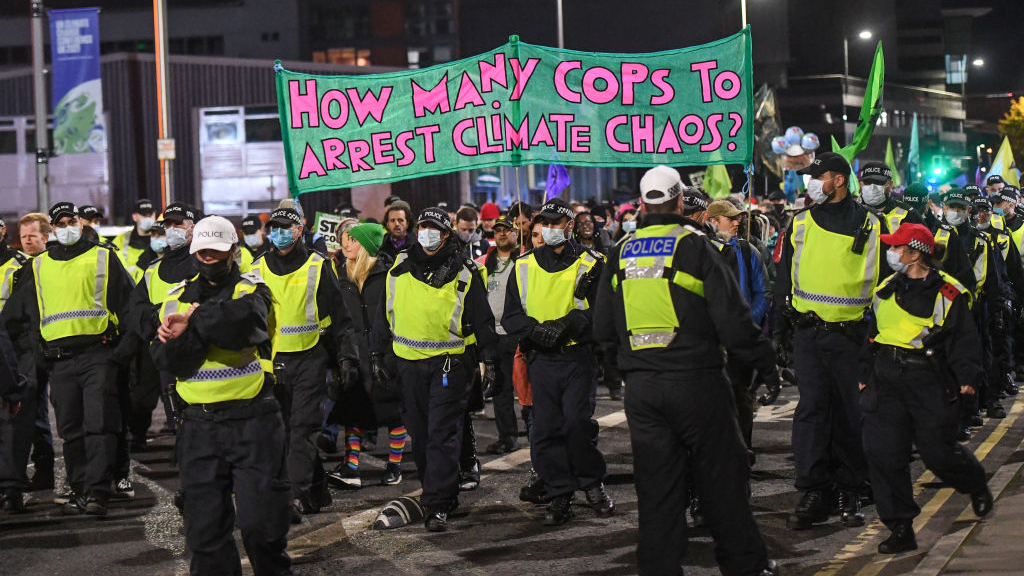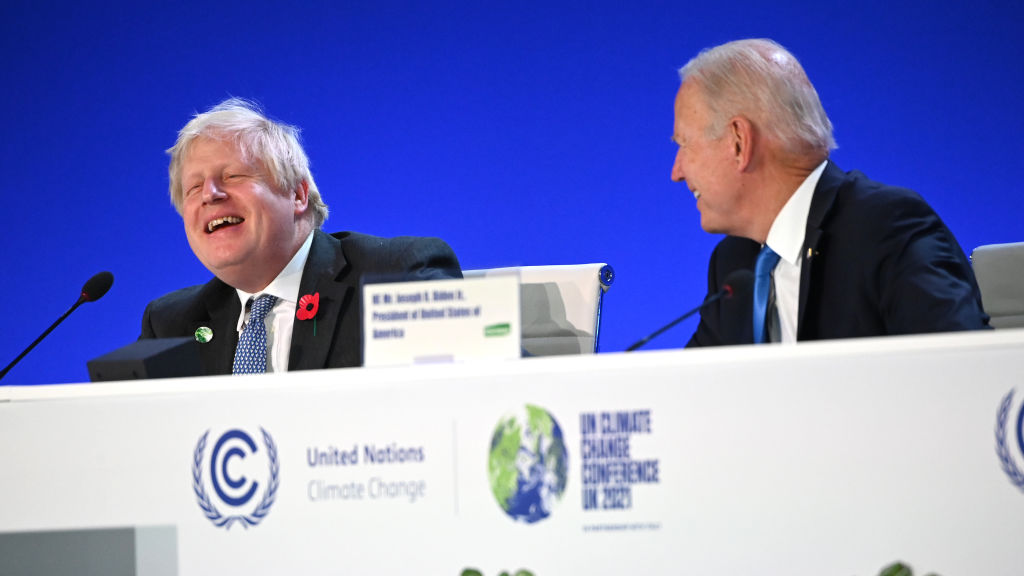
Police officers escort an Extinction Rebellion protest outside the COP26 Summit in Glasgow, UK, November 3, 2021. /Getty
Police officers escort an Extinction Rebellion protest outside the COP26 Summit in Glasgow, UK, November 3, 2021. /Getty
Editor's note: Bradley Blankenship is a Prague-based American journalist, political analyst and freelance reporter. The article reflects the author's opinions and not necessarily the views of CGTN.
In a group of deals that came out November 2 during the ongoing COP26 in Glasgow, some world leaders pledged to end and reverse deforestation, cut back methane emissions and help South Africa end its dependence on coal. While all of these proposals sound good, they run the risk of being all talk when the world needs serious action.
On the topic of deforestation, it's important to know first and foremost that such pledges have been taken before. In 2014, the U.S., Canada and the entire European Union, which then included the UK, signed an agreement to cut deforestation in half by 2020 and end deforestation by 2030. However, deforestation in many countries has only accelerated in that time.
On methane emissions, Joe Biden's administration on Tuesday launched a plan to reduce them, after the President at the summit called for other countries including those in the EU to reduce global methane emissions by 30 percent by 2030. This reduction would be consequential for pushing back against climate change; however, a few key details indicate that the plan is quite flimsy.
This is mainly because Biden's plan will be conducted by a number of branches of the government, including the Environmental Protection Agency, as well as the Departments of Transportation, Interior, and Agriculture, in line with an executive order.
The proposed requirements would reduce methane emissions from U.S. drilling operations and equipment by about 75 percent by 2030, compared with 2005. Based on the Clean Air Act, this rule would be even stricter than the 2016 standard set under former President Barack Obama, which was reinstated last summer in Congress by Democrats to overturn a regulatory rollback by President Donald Trump.
The problem is that without congressional action, this new standard could easily be rolled back by the next president through an executive order. Given that Biden's approval is sitting at an average of 42.8 percent (as of November 2) and his party has failed to deliver as promised in Congress, it seems likely that Republicans could win back Congress in 2022 and the White House in 2024, meaning any such climate regulation would be doomed.

Britain's Prime Minister Boris Johnson and U.S. President Joe Biden during the World Leaders' Summit "Accelerating Clean Technology Innovation and Deployment" session on day three of COP26 in Glasgow, Scotland, November 2, 2021. /Getty
Britain's Prime Minister Boris Johnson and U.S. President Joe Biden during the World Leaders' Summit "Accelerating Clean Technology Innovation and Deployment" session on day three of COP26 in Glasgow, Scotland, November 2, 2021. /Getty
In addition, petroleum industry groups in Washington are successfully pushing back on legislation in Congress right now that would penalize companies for methane leaks. In turn, Biden's plan focuses on various forms of incentives – that is basically taxpayer money going toward polluters – instead of levying fees for skirting regulations.
Creating tax or financial incentives for individuals and families to switch over to renewables is a fair and effective policy. Making taxpayers foot the bill for fixing pipelines operated by large corporations, without serious penalties, is neither fair nor effective.
Given the U.S.'s large volume of emissions, it's imperative that Washington be more aggressive in reining in greenhouse gases, especially regardless of electoral outcomes.
Finally, the U.S., the UK, France and Germany announced an initiative to help South Africa phase out coal. The four countries have pledged $8.5 billion in loans and grants, in addition to expertise, over five years to help meet this end.
South Africa is the continent's largest greenhouse emitter, drawing about 90 percent of its electricity from coal-fired plants. This might read poorly at first glance but is insignificant in the broader scheme when one considers that the entire African continent itself produces about 3.8 percent of the world's greenhouse gas emissions.
Developed countries definitely need to help South Africa, plus the African continent in general, develop renewable energy since doing so independently while also pursuing economic development would pose serious and potentially insurmountable challenges.
But let's not miss the bigger point: Developed countries produce a much greater share of global emissions than the African nation and thus have a greater share of responsibility in making cuts.
This group of deals struck during the COP26 mainly composed of Western countries are a step in the right direction, since something is better than nothing; however they fall well short of what is actually needed – and several seem to miss the mark completely.
(If you want to contribute and have specific expertise, please contact us at opinions@cgtn.com.)

